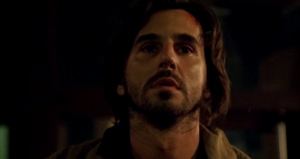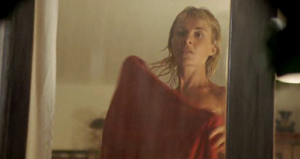Second Coming
America in the not-too-distant future: young Harrison Bergeron is a constant source of concern to his parents. Despite his best efforts, he continues to display above-average intelligence in a world where everyone is expected to be equal. For some reason, his government-regulated headband isn’t suppressing his higher brain functions the way everyone else’s does. Fortunately, the local physician has the answer: lobotomy. Bergeron is then given one night to enjoy his natural talents before they are surgically removed for good. That evening, he discovers the truth of the world around him – not so long ago, the world was a very different place, where intelligence was not regulated and people were free to be different. More disturbing than that however, is the reason why everything changed.
Harrison Bergeron is a 1995 adaptation of the Kurt Vonnegut short story of the same name. Purists decry it as an unfaithful interpretation of the original, but in fact, it has much to recommend it, providing a strong social commentary on state control and media manipulation. When watching it, I was reminded of everything from Margaret Attwood’s ‘The Handmaid’s Tale’ to ‘Brave New World’, ‘Nineteen Eighty-Four’, The Stepford Wives and even The Matrix. It’s worth a look.
“I was reminded of everything from Margaret Attwood’s ‘The Handmaid’s Tale’ to ‘Brave New World’, ‘Nineteen Eighty-Four’, The Stepford Wives and even The Matrix.”
Last week, World On Film went amorously Catalonian, but not within the borders of the one country that claims the culture for its own: Andorra. That, however, is rectified this week with the short film…
Don’t Take The Name Of God In Vain
(1999) Director: Josep Guirao
“I seem to remember Sherlock Holmes telling Dr. Watson that when you eliminate the impossible, whatever remains must be the truth. If we apply that to Jeremiah, the one thing that remains is that there’s no way in hell that he can be a normal man with normal abilities–if he’s a man at all.” Excerpt from The Branch by Mike Resnick
In Andorra of the year 2046, a powerful gang lord assembles a group of religious leaders, demanding to know what it takes to be a true messiah. Meanwhile, lying imprisoned in a garage somewhere nearby is a man who claims to be the son of God. But is this really the messiah everyone was waiting for? Such is the premise of the short film, ‘Don’t Take The Name Of God In Vain’, which in the very beginning, claims to be “Dedicated to those who died in the name of a god, even though his name was never spoken.” The effort is based on the 1984 sci-fi novel ‘The Branch’ by Mike Resnick, something I have yet to read and therefore am judging the film purely on its own merits.
The storyline is certainly an interesting one, and the premise asks questions some of the more credulous among us would do well to ponder. However, even at just 32 minutes, the execution is about 10 minutes too long and cheaply melodramatic. With a subject matter such as this, it certainly ought to be stirring. The script as executed feels slightly ‘Dan Brown’ – excessively didactic without ringing true, and having rather foolishly worked my way through The Lost Symbol recently, the overblown lecturing smarts all the more. The first half of the film is quite literally a group of two-dimensional stereotypes arguing about the qualities of a messiah, and it’s not until 20 minutes in that we finally see what the fuss is really about. It might have been better as a two-hander between the man insisting divine credentials and the one persecuting him, through which his claim to holy fame is slowly revealed. Or in other words, if you’ve only got the budget for a single set stage play, it’s probably best to be cautiously realistic. Pau Baredo as the chief antagonist is definitely reaching for the OTT trophy, when a more controlled performance would have been far more effective, although the rest of the cast are just as willing to yell into the microphone. It’s fairly apparent that all involved are meant to be caricatures, but this is a story demanding of greater subtlety. On the plus side, director Josep Guirao knows his financial limits and makes good use of low lighting and simple props.
“The script as executed feels slightly ‘Dan Brown’ – excessively didactic without ringing true”
Nonetheless, while the Catalan commentary on the Second Coming may lack finesse, ‘Don’t Take The Name Of God In Vain’ has inspired me to give ‘The Branch’ a spin. If it also treads the Brown path, I may just have to cut Guirao some slack. Having skimmed through the source material on Google Books, I do at least know that the film is a very truncated adaptation, budgetarily-challenged and depicting principally its interpretation of the climax. This paradoxically makes it seem both overlong and rushed at the same time – clearly a novel requiring more than just a couple of euros and a warehouse downtown to bring it properly to life.
Where I Live (Compensation for the short review above)
Where I live, the multiplex cinemas are exactly the same as yours – giant, self-contained enclaves filled with escalators and dim neon lights designed to banish the world outside. Within, you will find the same kiosks selling chocolate covered sugar bullets, caffeine and snow-covered popcorn at prices designed to belittle you for your weak glucose-dripping willpower. And yet, where you live, the owners of these cinematic honey traps take a very dim view of externally-bought consumables. After all, if you’ve already passed beyond their escalators and neon facade, they feel justified in securing exclusive rights to your wallets. Not that this stops many a visitor from secreting illicit outside snacks about their person never to be seen until the lights go down. These very words have been typed by the voice of experience.
Yet I was astonished to discover that where I live, people actually complained about it to the point where the nation’s cineplexes backed down. No longer did a Dunkin Donuts bag have to be hastily shoved under a jumper before the pimply ticket-tearer clapped his eyes upon you. It wasn’t a problem if you sauntered in with a bag of cheap popcorn unmolested by icing sugar from the local supermarket. Bottles of cola purchased elsewhere could be waved around with the stage-acted conspicuousness of Mr Bean and his pencils in the exam sketch, instead of those giant overpriced cylinders of ice cubes doused with only a slightly greater portion of fluid than is today allowable inside the cabin of a commercial aeroplane.
“Bottles of cola purchased elsewhere could be waved around with the stage-acted conspicuousness of Mr Bean and his pencils in the exam sketch”
Ah, but what of that overpriced selection of multicoloured plastic-wrapped caloric diabetes samplers from the cinema’s own snack bars? There I sat in the dim blue foyer, waiting to go and see Inception, staring in wonder at the completely unpopulated serving counter beyond which one solitary striped-shirted minion of cinematic side-dishes attempted in vain to look busy by scribbling ink onto a clipboard, while surreptitious slurping could be heard all around me. I knew they hadn’t pestered her for their sugar fixes. I almost felt sorry for her. Almost.
Where I live is South Korea and this is the power of collective complaint.
It’ll never last.
Coming Up Next
Snippets of life in modern Angola as World On Film investigates the long and short of the short offering, Moments Of Glory.
Nice ‘N Sleazy
Hello again. In the sultry, summer humid hideousness that is the first week of August (as opposed to the rest of it?), I managed to catch a film from 2009 I’m sure many have never heard of – Triangle, a thriller drawing inspiration from the Bermuda polygon of the same name, although only in a very distant sense. A group of friends go sailing one morning, only to find themselves caught up in a freak storm. Barely surviving their way through the high seas and deluge, the capsized crew suddenly finds an ocean liner in their path. But relief turns to bewilderment when the seemingly empty vessel proves more dangerous than any high seas-thunderstorm. And why does one of the survivors recognise the ship despite never having set foot on its decks? For answers, they must return to the end of the beginning. Triangle, starring former Australian soap star Melissa George, is one of those films that will appeal more to fans of mainstream film than genre aficionados. It explores a number of interesting concepts that many a horror or sci-fi have entertained before it, but despite its shortcomings, Triangle is intriguing and compelling enough for the viewer to want to see their way through to the end.
“Despite its shortcomings, Triangle is intriguing and compelling enough for the viewer to want to see their way through to the end.”
At any rate, last week, I posted the trailer to Amor Idiota, this week’s film up for review. If you missed the trailer, you’ll find it at the bottom of the previous post. The original intention was to descend upon the principality of Andorra, the small country between Eastern Spain and France. IMDB, the ever-helpful companion providing inspiration for every film I select on my global journey, assured me that Amor Idiota was a Spanish-Andorran co-production. However, the film is shot and set in Spain, so whatever connection it has with Andorra remains a mystery – financial, I presume. On the other hand, the Spanish province of Catalonia shares both the same cultural background and indeed language as its neighbour, so much so, that with the growing Catalonian cries for independence, I can’t help wondering if political maps of the not-too-distant future might see very different Western European borders. But enough of that. Let’s move on to the film itself.
Amor Idiota
(2004) Directed by Ventura Pons
“My life’s been one long, fruitful journey towards idiocy. As a teenager, I realised I was an idiot. Later, I discovered I wasn’t the only one. Now that I’m pushing 35, I see that not only is everyone an idiot, but that we’ll never stop being so.”
Pere-Lluc is a man unsatisfied by ordinary life. In his mid-thirties and drifting through an existence devoid of meaning, he passes his days a slave to his instincts, aware of the consequences reckless abandon brings, but entirely unmotivated by reason or common sense. A chance encounter with the striking and married director of an advertising firm one evening suddenly gives his life purpose, as he pursues her with a desperate licentiousness – aware of the consequences, but a slave to animal instinct. Inevitable misunderstandings ensue, but Pere-Lluc cannot fight his instincts – he must have the object of his desire, even if it means suffering pain and humiliation to get it.
With Amor Idiota, I find myself challenged to pin down the point writer Lluís-Anton Baulenas and director Ventura Pons were trying to make: ‘stalking – you’d pretty much have to’, perhaps? There are certainly strong indicators that the more well-trodden message of love, wandering, and sunsets will lift us through the chaotic waters of emptiness and self-loathing is the principal message. Unfortunately, the characters designed to illustrate this ideal are painted far too shallow to make any of their actions believable, let alone convince the viewer of the ending that results almost in spite of their actions. Their maladjusted behavior and fatalistic philosophies, which form much of the film’s dialogue, are ultimately squandered as a result. It’s interesting in turn how hard the script attempts to apologise for its lead character’s impulses, with Pere-Lluc being highly self-aware of his ‘idiocy’, as though the idea that someone unfulfilled by ordinary life is horribly wrong – clearly they must be social refuse.
“With Amor Idiota, I find myself challenged to pin down the point writer Lluís-Anton Baulenas and director Ventura Pons were trying to make: ‘stalking – you’d pretty much have to’, perhaps?”
‘Idiocy’ here is almost a misused euphemism – acting upon impulse alone suggests a lack of intelligence, yet in human terms this does not make the principal characters stupid, merely self-centred, driven to depression and frustration by the ticking clock and their inability to subscribe to society’s expectations of where they should now be in their thirties. I can easily sympathise with anyone who finds themselves in this position, yet because the dramatis personae in Amor Idiota are drawn in such unsympathetic and antisocial ways, this entire avenue of middle-aged social commentary is bulldozed to rubble within the first few minutes, the remaining debris atomised by the stunning cowardice or perhaps cornball mismatch (I can’t decide which) of the ending.
Yet the whole misadventure did not leave me bored, perhaps because its silliness kept me guessing. Somehow, I felt compelled to find out where Pons was going with all his maltreated philosophy, and would Pere-Lluc have evolved as a person now that stalking had given his life meaning? I wasn’t best pleased with the result. The film’s unpleasant characters and grotesque discourse compelled me despite myself, curious to see how it would all come to a head, but the finale made me feel an idiot for watching.
“The film’s unpleasant characters and grotesque discourse compelled me despite myself, curious to see how it would all come to a head, but the finale made me feel an idiot for watching.”
The unsurprising standouts of the cast itself are Santi Millan, whose portrayal of the bored, intellectual sleaze Pere-Lluc is right on the money, assuming that this was the intent. I probably saw a bit more of his genitals than I would have liked – that they are symbolic of Pere-Lluc’s surrender to his animal instincts is more desirably clear through the several thousand lines of dialogue stating this point. Cayetana Guillén Cuervo provides an interesting contrast, with the character of Sandra slowly revealing the many layers of her troubled personality to the point where she fits right in with the rest of the gang of misfits. With Pere-Lluc baring all that he is from the beginning, this peeling of the onion provides a welcome and necessary contrast given the ultimate similarity of the leads -seemingly doomed to self-destruction from the very outset.
While I’m not a devotee of the romance genre, I can’t help feeling that it’s so over-mined that the sub-oeuvre of ‘misfits in love’ itself is bound to have been explored to better gain elsewhere. Whether Ventura Pons will have been discovered to have been deeply misunderstood is something for future ages to ponder. For now though, Amor Idiota stands as a mish-mash of valid discourse executed badly, causing at least this reviewer to wonder if he’s either missed the point or been punished for thinking too deeply. Then again, the lead characters manage to achieve both without really coming to a satisfactory conclusion. That in the end, is how this Barcelona farce left me.
Next Time…
However, it isn’t the end of World On Film’s Catalan connection. Sometime later, I managed to find a short film actually shot and set this time in Andorra itself and that will be the subject of next week’s post when we discover the Biblically-inspired – and unfortunately trailer-less – sci-fi drama, Don’t Take The Name Of God In Vain.













